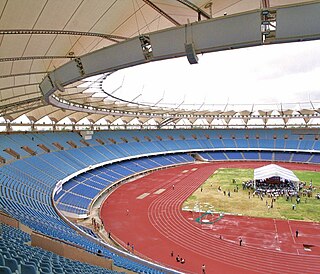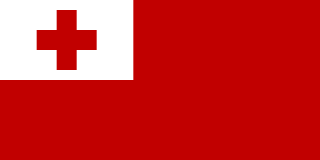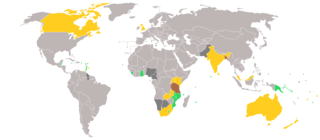
The 2010 Commonwealth Games, officially known as the XIX Commonwealth Games and commonly known as Delhi 2010, were an international multi-sport event for the members of the Commonwealth that was held in Delhi, India, from 3 to 14 October 2010. A total of 4352 athletes from 71 Commonwealth nations and dependencies competed in 21 sports and 272 events, making it the largest Commonwealth Games to date. It was also the largest international multi-sport event to be staged in Delhi and India, eclipsing the Asian Games in 1951 and 1982. The opening and closing ceremonies were held at the Jawaharlal Nehru Stadium, the main stadium of the event.

The 1998 Commonwealth Games, officially known as the XVI Commonwealth Games, were a multi-sport event held in Kuala Lumpur, Malaysia. The 1998 games were the first held in Asia and the last Commonwealth Games of the 20th century. For the first time ever, the games included team sports. The other bid from the 1998 games came from Adelaide in Australia. Malaysia was the eighth nation to host the Commonwealth Games after Canada, England, Australia, New Zealand, Wales, Jamaica and Scotland. Around 3638 athletes from 70 Commonwealth member nations participated at the games which featured 214 events in 15 sports with 34 of them collected medals.

The Commonwealth Youth Games (CYG) is an international multi-sport event organized by the Commonwealth Games Federation. The games were held in the years, mid-way between when the Commonwealth Games are held, until 2008. They continued to be held every four years, but in the year after the Commonwealth Games are held, from 2011 to 2015. Since 2017, they've been held in the year before the Commonwealth Games are held. The first edition was held in Edinburgh, Scotland from 10–14 August 2000. The age limitation of the athletes is from 14 to 18.

The 2008 Commonwealth Youth Games, officially known as the III Commonwealth Youth Games, and commonly known as Pune 2008, a regional sporting event that was held from 12 to 18 October 2008 in Pune, India, a city in the state of Maharashtra. They were the third Commonwealth Youth Games, which are held every four years; they were the first Commonwealth Youth Games to be held in Asia.
The Olympic medal table is a method of sorting the medal placements of countries in the modern-day Olympics and Paralympics. The International Olympic Committee (IOC) does not officially recognize a ranking of participating countries at the Olympic Games. Nevertheless, the IOC does publish medal tallies for information purposes, showing the total number of Olympic medals earned by athletes representing each country's respective National Olympic Committee. The convention used by the IOC is to sort by the number of gold medals the athletes from a country have earned. In the event of a tie in the number of gold medals, the number of silver medals is taken into consideration, and then the number of bronze medals. If two countries have an equal number of gold, silver, and bronze medals, they are ordered in the table alphabetically by their IOC country code.

The 2002 Asian Games was a multi-sport event held in Busan, South Korea from September 29 to October 14, 2002. Busan was the second South Korean city to host the Games, after Seoul in 1986. A total of 6,572 athletes—4,605 men and 1,967 women—from 44 Asian National Olympic Committees (NOCs) participated in 38 sports divided into 419 events. The number of competing athletes was higher than the 1998 Asian Games, in which 6,544 athletes from 41 NOCs participated. It was the first time in the history of the Asian Games that all 44 member nations of the Olympic Council of Asia (OCA) participated in the Games. Afghanistan returned after the fall of the Taliban government in the midst of ongoing war; East Timor, newest member of the OCA made its debut; and North Korea competed for the first time in an international sporting event hosted by South Korea. Both nations marched together at the opening ceremony with a Korean Unification Flag depicting the Korean Peninsula as United Korea.

The 1982 Asian Games [a] was a multi-sport event held in Delhi, India, from 12 November to 4 December 1982. A total of 3,411 athletes from 33 National Olympic Committees (NOCs) participated in these games, competing in 147 events in 21 sports and 22 disciplines. The number of participating countries was the greatest in Asian Games history. Sport events of handball, equestrian, rowing and golf were included for the first time; while fencing and bowling were excluded. This medal table ranks the participating NOCs by the number of gold medals won by their athletes.

Canada competed at the 2011 Commonwealth Youth Games held in the British Crown Dependency of Isle of Man from September 7 to 13, 2011. Their participation marked their third Commonwealth Youth Games appearance. Canada was represented by the Commonwealth Games Canada, the association which is responsible for Commonwealth Games and Commonwealth movement in Canada. The delegation of 70 people included 56 competitors and 14 coaches and supporting staff.

Athletics was one of the seven sports of the 2011 Commonwealth Youth Games. Held between 9 and 11 September, the events were staged at the National Sports Centre in Douglas, Isle of Man.

India competed at the 2011 Commonwealth Youth Games held in the Isle of Man from 7 to 13 September 2011. India has participated in all the editions of the Commonwealth Youth Games. The nation was represented by the Indian Olympic Association, which is responsible for the Commonwealth Games and Commonwealth Youth Games in India.

Zambia competed in the 2011 Commonwealth Youth Games held in the British Crown Dependency of Isle of Man from 7 to 13 September 2011. National Olympic Committee of Zambia sent a delegation of eight people included six competitors – all men – and two officials. The Zambian delegation was economically supported by the Commonwealth Games Federation. Zambia won only one bronze medal and finished last in the medal table, with 10 other Commonwealth Games Associations.

Barbados competed in the 2011 Commonwealth Youth Games held in the British Crown Dependency of Isle of Man from September 7 to 13, 2011. The nation was represented by the Barbados Olympic Association, which is responsible for the Commonwealth Games and Commonwealth Youth Games in Barbados.

Dominica competed in the 2011 Commonwealth Youth Games held in the British Crown Dependency of Isle of Man from September 7 to 13, 2011. Their participation marked their second Commonwealth Youth Games appearance. The Dominican delegation consisted of four competitors who competed in two different sports. This was a decrease in the number of athletes from the nation's last appearance at the Games, when five athletes were sent to Pune. Shanica Yankey won a bronze medal in the javelin throw with a best throw of 38.08 m. Yankey was the only medal winner for Dominica, and the country finished last in the medal table, in 22nd position, sharing the position with nine other Commonwealth Games Associations. Yankey's was the first medal for Dominica in the history of the Games.

Solomon Islands competed in the 2011 Commonwealth Youth Games held in the British Crown Dependency of Isle of Man from 7 to 13 September 2011. Their participation marked their third Commonwealth Youth Games appearance. The Solomon Islands delegation consisted of three athletes who competed in four events in two different sports. This was a decrease in the number of participating athletes from the nation's last appearance at the Games when seven athletes were sent to Pune.

The Turks and Caicos Islands competed in the 2011 Commonwealth Youth Games held in the British Crown Dependency of Isle of Man from 7 to 13 September 2011. Their participation marked their second Commonwealth Youth Games appearance. The Caribbean British Overseas Territory sent a delegation that consisted of three competitors participating in the athletics—one out of seven sports of the Games—events only. This was a decrease in the number of athletes from the nation's last appearance at the Games, when eight athletes were sent to the 2008 Commonwealth Youth Games in Pune. Ifeany Otounye won the sole medal of the Turks and Caicos Islands in the Games, a bronze in long jump with a best jump of 7.15 m, setting a new national record in the event. Otounye improved the national record by 5 centimeters, the previous one was 7.10 m, set by Levard Missick 13 years ago during the 1998 Commonwealth Games in Kuala Lumpur, Malaysia. Turks and Caicos Islands ranked last—at 22nd spot—in the medal table of the Games, the position shared by nine other Commonwealth Games Associations.

Tonga competed in the 2011 Commonwealth Youth Games held in the British Crown Dependency of Isle of Man from 7 to 13 September 2011. Their participation marked their second Commonwealth Youth Games appearance. The delegation of Tonga consisted of three officials and four competitors participating in three different sports— athletics, boxing and swimming. This was a decrease in the number of athletes from the nation's last appearance at the Games, when nine athletes were sent to the 2008 Commonwealth Youth Games in Pune. Heamasi Sekona won a bronze in the light heavyweight class of boxing without winning a single bout. Sekona was the only medalist from Tongan side. None of the rest three athletes advanced past the qualifying stages, and thus did not win any medals. Katiloka ranked eighth overall in the qualifying round for triple jump; middleweight boxer, Pomale, lost to Cody Crowley of Canada in his first round match. Additionally, Prescott ranked 18th and 13th in the heat rounds of 50 m and 100 m backstroke events respectively. Sekona's was the first medal for Tonga in the history of the Games.

Saint Kitts and Nevis competed in the 2011 Commonwealth Youth Games held in the British Crown Dependency of Isle of Man from 7 to 13 September 2011. Their participation marked their second Commonwealth Youth Games appearance. Saint Kitts and Nevis sent a delegation consisting of three athletes who participated in three athletic events. This was a decrease in the number of participating athletes from the nation's last appearance at the Games when six athletes were sent to Pune. Adrian Williams earned a bronze medal in the javelin throw, with a best throw of 63.02 m. Williams was the only medalist for Saint Kitts and Nevis, and helped his nation to manage a place in the medal table. Saint Kitts and Nevis ranked last with nine other Commonwealth Games Associations. This was also the first medal for Saint Kitts and Nevis in the history of the Games.

Malaysia participated in the 2011 Commonwealth Youth Games held in the British Crown Dependency of Isle of Man from 7 to 13 September 2011. Their participation marked their fourth Commonwealth Youth Games appearance, one of the highest among the Commonwealth of Nations. Malaysia was represented by the Olympic Council of Malaysia, which is responsible for Malaysian participation in the multi-sport events, including Commonwealth Games and Commonwealth Youth Games. Malaysian delegation consisted of 18 athletes competed in four different sports— athletics, badminton, cycling, and swimming. This was an increase in the number of athletes from the nation's last appearance at the Games, when 10 athletes were sent to the 2008 Commonwealth Youth Games in Pune. Malaysia dominated in the badminton events, winning all but one of the five gold medals on offer, the only other gold was won by P. V. Sindhu of India in women's singles. All the medals came from badminton.

Bangladesh competed in the 2011 Commonwealth Youth Games held in the Isle of Man from 7 to 13 September 2011. This was their second appearance in the Commonwealth Youth Games. The nation was represented by the Bangladesh Olympic Association, which is responsible for the Commonwealth Games and Commonwealth Youth Games in Bangladesh.

The 2008 Commonwealth Youth Games, officially known as the III Commonwealth Youth Games, were a multi-sport event held in the Indian city of Pune from 12 to 18 October 2008. This was the first time in the history of the Commonwealth Youth Games that the Games were organised in Asia. At the Games, 1220 athletes between 14 and 18 years of age from 71 Commonwealth of Nations competed in nine sports.



















